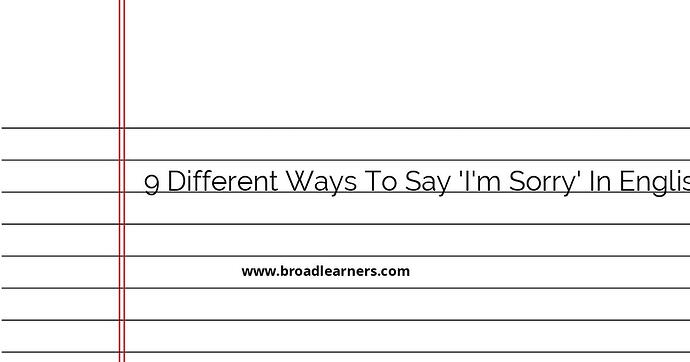Apologizing is an important skill to have in both personal and professional relationships. However, saying 'I'm sorry' all the time can become repetitive or insincere. It's useful to have alternative phrases to express your apologies. Here are nine different ways to say 'I'm sorry' in English:
- I apologize for...
- My apologies...
- I'm so sorry for...
- Regrettably,...
- Forgive me for...
- I want to apologize for...
- It's my fault...
- Pardon me for...
- I humbly apologize for...
1. I apologize for...
This phrase is a formal way to express your apologies. It acknowledges your mistake and shows that you take responsibility for your actions. Use it in professional settings or when you need to convey a serious apology.
Example:
I apologize for the mistake I made in the report. It was an oversight on my part, and I take full responsibility for it.
2. My apologies...
This phrase is a more casual way to say 'I'm sorry.' It's commonly used in everyday conversations to acknowledge a mistake or inconvenience caused to someone else.
Example:
My apologies for the delay in responding to your email. I had some technical issues with my computer.
3. I'm so sorry for...
This phrase is used when you want to express a deeper level of remorse or regret. It conveys a strong sense of empathy and sincerity in your apology.
Example:
I'm so sorry for the pain I caused you. I never intended to hurt your feelings.
4. Regrettably,...
Using 'Regrettably' at the beginning of your sentence adds a formal tone to your apology. It implies that you sincerely regret your actions or the consequences of your actions.
Example:
Regrettably, I forgot to return your book on time. I understand if you're upset with me.
5. Forgive me for...
This phrase is a humble way to ask for forgiveness. It shows that you acknowledge your mistake and sincerely hope to be forgiven.
Example:
Forgive me for my thoughtless comment. I didn't mean to offend you.
6. I want to apologize for...
This phrase emphasizes your desire to make amends and take responsibility for your actions. It shows that you genuinely want to make things right.
Example:
I want to apologize for the misunderstanding. Let's discuss it and find a solution together.
7. It's my fault...
Taking full blame by saying 'It's my fault' shows accountability and sincerity. It's a straightforward way to apologize and accept responsibility.
Example:
It's my fault that I forgot to invite you to the meeting. I apologize for the oversight.
8. Pardon me for...
This phrase is a polite way to apologize for a minor mistake or inconvenience. It's often used in formal situations or when seeking forgiveness.
Example:
Pardon me for interrupting you. May I ask a quick question?
9. I humbly apologize for...
This phrase conveys a sense of humility and sincerity in your apology. It shows that you are genuinely sorry for your actions and seek forgiveness.
Example:
I humbly apologize for my unprofessional behavior during the meeting. I will make sure it doesn't happen again.
Remember, the key to a genuine apology is sincerity. Use these alternative phrases to convey your remorse and take responsibility for your actions, and always be willing to make amends.
Did I miss anything? Respond below
